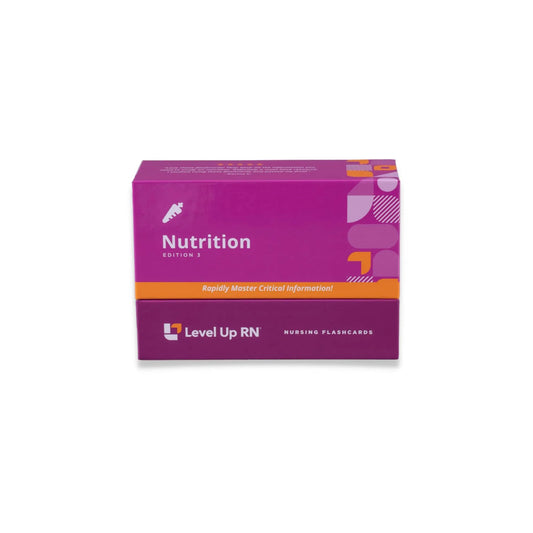Hi, I'm Cathy with Level Up RN. In this video, I will be discussing vegetarian diets as well as religious and cultural dietary considerations. And at the end of the video, I'm going to give you guys a quiz to test your understanding of some of the key points I'll be covering. So definitely stay tuned for that. And if you have our Level Up RN, Nutrition Flashcards, go ahead and pull out your flashcards so you can follow along with me and pay close attention to the bold red text on the back of the cards because those are the things that you are likely to get tested on in nursing school.
Let's start off by talking about vegetarian diets, which are focused on plant-based foods. A vegan diet excludes all animal products. This includes meat, poultry, fish, dairy products, and eggs. A lacto-vegetarian diet excludes meat, poultry, fish, and eggs, but allows for dairy products. And then a lacto-ovo vegetarian diet excludes meat, poultry, and fish, but allows for dairy products and eggs. And then a pescatarian diet is the addition of seafood or fish to a vegetarian diet. Vegetarian diets are associated with a decreased risk of diabetes, hypertension, heart disease, and cancer. However, it's important to make sure the individual is getting enough protein, vitamin B12, iron, calcium, vitamin D, and omega-3 fatty acids because in some cases, those nutrients may be lacking depending on the individual's food choices.
Let's now talk about religious dietary considerations. So I will be going over some general religious dietary practices that you should be familiar with in nursing school. But I do want to emphasize that food practices can vary significantly among individuals. And you should always ask your patient directly about their dietary restrictions and preferences. In the Buddhist faith, individuals often avoid alcohol, and many are vegetarian. In addition, intermittent fasting is very common. Roman Catholics may avoid meat on the Fridays of Lent, Ash Wednesday, and Good Friday. In addition, fasting is often practiced. In Hinduism, individuals often avoid alcohol, and many are vegetarian. In addition, fasting is often practiced, and certain foods may be forbidden. In Islam, pork products and alcohol are prohibited, and Muslims will often fast during the month of Ramadan. Jehovah's Witnesses avoid food that contains blood. In Judaism, individuals may be kosher observant, which means that pork products, shellfish, and meat with dairy is prohibited. So a hamburger would be okay to consume, but a cheeseburger would not. And then finally, in the Church of Latter-day Saints, many Mormons abstain from alcohol, coffee, and non-herbal teas.
We're now going to talk about cultural dietary considerations. And just as a reminder, food preparation practices and dietary preferences will vary widely among individuals. So you want to ask your patient about their dietary preferences and not make any assumptions. A traditional soul food diet that may be consumed by African Americans or other individuals is often high in fat, cholesterol, and sodium. It's also important to note that African Americans have an increased risk for obesity, heart disease, stroke, hypertension, and diabetes. A traditional Mexican diet is low in fat and high in fiber with an emphasis on corn, rice, and beans. However, due to acculturation, which includes adopting the dietary practices of the host country, this has led to a decreased intake of fiber, vegetables, and fruit, and an increased intake of fat and sodium. Of note, Hispanic individuals are at increased risk for obesity and diabetes. And finally, Asian-American diets tend to place emphasis on rice and vegetables with limited consumption of dairy products. Their sodium intake is often higher, but of note, Asian-Americans have a decreased risk of obesity and an increased life expectancy.
All right. It's quiz time, and I've got three questions for you.
Question number 1. What is a lacto-vegetarian diet?
The answer is, it's a diet that excludes meat, poultry, fish, and eggs but allows for dairy products.
Question number 2. If an individual is kosher-observant, meat is prohibited. True or false?
The answer is false. However, meat with dairy is prohibited.
Question number 3. Dietary blank is when a person moves from their home country and adopts the dietary practices of their new host country.
The answer is acculturation.
All right. That's it for this video. I hope it was helpful. Thank you so much for watching, and good luck with studying.
[BLOOPERS]
Iron, calcium, vitamin D, and omego, omegamegamager, burger, burger.


